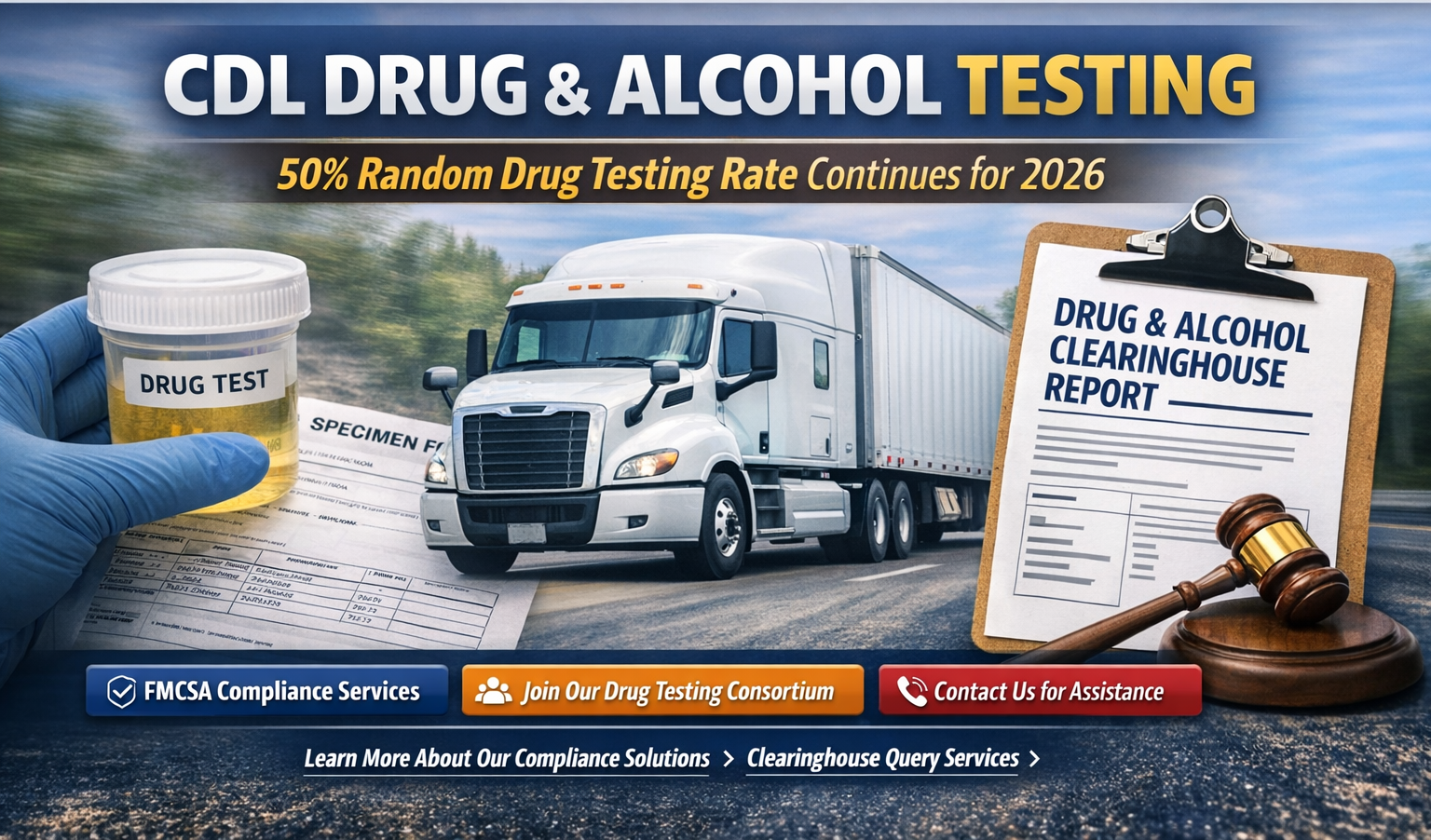Compliant Drivers Program: How It Works
November 4, 2025
Share this article:
Managing a fleet comes with high stakes. One missing document or overlooked violation can put operations at risk. Many trucking companies struggle to keep up with the Federal Motor Carrier Safety Administration (FMCSA) driver requirements while also running day-to-day routes and deliveries.
A compliant driver's program helps take that pressure off. It organizes the key parts of
driver compliance, including qualification files, motor vehicle records, and drug and alcohol testing, so your team stays audit-ready and focused on moving freight.
The Importance of Driver Compliance
Every driver on the road represents your company’s reputation and risk profile. If a driver lacks proper documentation or has unresolved violations, the entire operation could face fines, delays, or failed audits. DOT compliance is more than a requirement. It protects your operating authority and keeps your business moving.
Gaps in compliance can lead to out-of-service orders, higher insurance costs, and lower Compliance, Safety, Accountability (CSA) scores. These problems interrupt service, impact contracts, and create barriers to growth.

A compliant drivers program creates structure around the process. It tracks requirements, flags issues early, and keeps driver records accurate. This reduces mistakes, supports consistent hiring practices, and keeps your fleet ready for audits at any time.
What a Compliant Drivers Program Includes
Meeting DOT requirements requires consistent oversight of driver records and safety procedures. A compliant drivers program brings key compliance tasks into one system, making it easier to stay on track and reduce risk.
Most programs include:
- Driver Qualification (DQ) file management
- Motor Vehicle Record (MVR) monitoring
- Drug and alcohol testing program oversight
- Ongoing compliance tracking and documentation updates
When these areas are managed consistently, companies can avoid last-minute scrambles during audits or inspections. The program also helps standardize internal processes, reduce clerical mistakes, and keep compliance tasks moving without disruption.
Managing Driver Qualification Files
Driver Qualification (DQ) files are one of the first things reviewed during a DOT audit. These records confirm that each driver meets the minimum requirements to operate a commercial vehicle. Missing or incomplete files are a common source of violations.
DQ files must include documents such as:
- A completed driver application
- Motor Vehicle Records from each state where the driver has held a license
- Medical certificates and any required waivers
- Road test certification or CDL license copy
- Annual reviews and updates
Organized file management lowers the chance of missing paperwork and helps fleets stay consistent across all drivers. Keeping everything current also reduces the risk of last-minute scrambles during audits or roadside inspections.
Monitoring Motor Vehicle Records
Motor Vehicle Records (MVRs) give insight into a driver's safety history and licensing status. The FMCSA requires carriers to obtain an MVR at the time of hire and then review it annually. However, relying only on annual checks can leave companies exposed to unknown violations or license suspensions.
Continuous MVR monitoring helps identify issues as they happen. This includes violations, suspensions, expirations, or other changes that could affect a driver’s eligibility. When problems are caught early, companies can take action before they lead to larger compliance risks.
Tracking MVRs through an organized program also simplifies the review process and keeps documentation ready for audits. Fleets that stay current avoid gaps that could lead to penalties or service disruptions.
Drug and Alcohol Testing Compliance

DOT-regulated carriers are required to maintain a drug and alcohol testing program that meets federal guidelines. Requirements include pre-employment testing, random testing, post-accident testing, and return-to-duty procedures. Missing any part of the process can result in serious violations and costly penalties.
Tracking test dates, results, and random selections requires ongoing coordination. Companies must also manage testing pool participation and maintain accurate records. Incomplete documentation or missed tests can result in out-of-service orders and put compliance scores at risk.
A structured program makes it easier to manage each testing stage and respond quickly when records are requested. Organized documentation also helps prevent delays during inspections or audits.
Using DOTFocused for Driver Management
DOTFocused brings all driver compliance tasks into one platform, making it easier to stay organized and proactive. Instead of managing files through spreadsheets or chasing down paperwork, companies can access real-time records and alerts in a centralized system.
The platform tracks key items like DQ file status, MVR monitoring, and drug and alcohol testing timelines. Automated reminders allow teams to stay ahead of expiration dates, missing documents, or upcoming review deadlines. When everything is in one place, compliance tasks become easier to manage and less likely to fall through the cracks.
DOTFocused also makes it simple to prepare for audits. All required records are accessible through a secure dashboard, so documentation can be pulled quickly when needed. This level of visibility helps reduce risk and improve confidence during inspections.
Working with a Compliance Partner
Staying aligned with FMCSA regulations requires time, attention, and a strong process. For many companies, juggling compliance on top of daily operations creates unnecessary risk. A dedicated compliance partner can step in to handle the details and reduce the pressure on internal teams.
National Fleet Services helps manage the key areas of driver compliance, including DQ files, MVR monitoring, and drug and alcohol testing. Clients also gain access to DOTFocused, which centralizes records and simplifies ongoing tracking.
Partnering with an experienced team brings more control and fewer surprises during audits or inspections. To learn how National Fleet Services can support your operation, request a demo or get in touch today.
fleet insights






